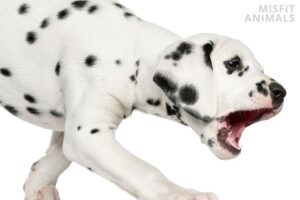It is normal for dogs to cough or pant after running. It is not normal after minimal effort though. If this is the case, it is possible your dog suffers from heart disease, bronchitis, kennel cough, or other respiratory problems. Contact the vet if your dog always coughs after running.
Dogs need daily exercise to stay fit and healthy. One of the best ways to do that is running.
As running can be strenuous, it’s not uncommon for dogs to cough afterward. But it is uncommon if it happens after the slightest bit of movement.
In this article, you will learn why dogs cough after running, what you can do to prevent coughing, how to improve your dog’s quality of life, and more.
If your dog coughs after every run or the slightest effort, it is necessary to contact the veterinarian.
Why Is My Dog Coughing After Running?
The most common reasons dogs cough after running are heart problems, lung parasites, bronchitis, lung infections, or kennel cough. In other cases, dogs have swallowed an insect, or their saliva went down the wrong pipe, which triggered coughing.
There are several reasons why your dog might cough after running. Some of these conditions may be related to swallowing a bug or saliva – the kind of problems humans sometimes have.
If this is the case, there is no need to panic. The coughing fit will pass by itself in a few moments.
Other times, the cause is an underlying condition that only occurs in connection with physical activity.
The best known is tracheobronchitis, more commonly referred to as kennel cough. Various viral infections and exposure to certain fungi can also trigger a dry cough after running.
Some of these conditions can be prevented by vaccinations, such as distemper. Other diseases, such as heart disease or cancer, require significantly more care than just one injection per year.
Here are the most common causes that can make dogs cough after running:
- Lung parasites
- Heart disease (including heartworms)
- Respiratory tract infections
- Kennel cough
1. Lung Parasites

Infestation of the lower respiratory tract causes coughing. It is much less common compared to the infestation of the stomach and intestines caused by gastrointestinal parasites such as roundworms or nematodes.
Lungworms infest the respiratory tract and damage the airways or lung tissue, generating an inflammatory reaction. Lung parasites live and reproduce in the tissues of the respiratory system.
There are several species of lungworms[1] identified in dogs:
- Oslerus osleri
- Crenosoma vulpis
- Eucoleus aerophilus
Dogs become infested with lung worms when they consume intermediate hosts infested with larvae (snails, frogs, earthworms) or by ingesting water, food[2], vomit, or diarrhea contaminated with eggs.
In lungworm infestations, coughing is the most frequently encountered symptom, which may appear more pronounced after effort. Other symptoms include:[3]
- Difficulty breathing
- Tiredness and depression
- Excessive bleeding and bruising
- Vomiting and diarrhea
- Loss of appetite
- Weight loss
- Hemorrhages in various organs
Lungworms can lead to death if left untreated.
Here’s what you can do to prevent lungworms:
- Use antiparasitic drugs for regular prevention.
- Do not let your dog eat food scraps from outside.
- Do not let your dog eat feces or grass.
- Do not let your dog drink water from puddles and bowls that are not his.
2. Heart Disease

Heart diseases affect the hear, thereby affecting the amount of oxygen pumped to the muscles and lungs during exercise. This can lead to coughing.
Here are the most common causes of heart disease in dogs that can cause coughing after running:
- Old age
- Obesity
- Congenital heart defects
- Lung diseases
- Heartworms
Up to a quarter of senior dogs end up suffering from cardiovascular problems. Unlike humans where heart diseases are mainly caused by an incorrect diet and a sedentary lifestyle, many dogs are genetically predisposed to such health problems.
Large and small dogs are affected differently by the genetic predisposition to heart problems. Large breeds are affected by dilated cardiomyopathy, in which the heart muscles dilate to the point of a heart attack.
The most affected large breeds[4] are:
- Doberman pinscher
- Great Dane
- German shepherd
- Mastiff
- Irish wolfhound
On the other hand, small dogs often suffer from mitral valve prolapse, which prevents the proper circulation of blood in the heart chambers.
The most affected small breeds[5] are:
- Chihuahua
- Miniature Poodles
- Bichon Maltese
- Beagle
- Cavalier King Charles Spaniel
- West Highland white terrier
As for heartworms, they can cause dirofilariasis – a parasitic heart disease caused by roundworms (Dirofilaria immitis).
The severity of this disease is directly determined by the number of worms present in the body and the time spent there.
Heartworms are transmitted through the bites of mosquitoes that carry inactive larvae. Dirofilaria then migrates through dogs’ bodies to the heart and blood vessels of the lungs. This process lasts about six months.
Dogs that live in environments with many mosquitoes are more prone to developing the disease.
Symptoms of heart disease include:
- Breathing difficulties: labored breathing and rapid breathing
- Dogs cough at the slightest effort
- Behavioral changes: dogs get tired quickly, want to play less, and are apathetic
- Loss of appetite
- Rapid weight gain or loss
- Nocturnal agitation
- Swollen abdomen
- Arrhythmias
- Vomiting
If you notice these symptoms in your dog, it is important to take it to a vet. Your dog’s life can be significantly extended with the proper treatment.
3. Respiratory Tract Infections

Respiratory tract infections can be caused by bacteria, fungi, or viruses.
Although fungal infections are rare, they are the most dangerous because they are contagious and have severe symptoms. Some of them can also be transmitted to humans.[5]
These are most often caused by Blastomyces dermatitidis and produce the disease called blastomycosis. Dogs become infected when they inhale the spores found in soil and wood.
Symptoms of respiratory infections may include:
- Difficulty in breathing
- Cough
- Fever
- Bloody nasal secretions
- Enlarged lymph nodes
- Skin lesions
- Lack of appetite and weight loss
- Eye and urinary problems
- Nervous signs
- Seizures
- Death
These infections are dangerous if left untreated, and are often confused with heart disease. It is recommended to take your dog to the vet’s office for a correct differential diagnosis and appropriate treatment.
4. Kennel Cough

Kennel cough, or canine infectious tracheobronchitis, is a respiratory infection that occurs frequently in dogs, especially in those that live in large groups.
This infection is similar to the human flu and affects the trachea and bronchial tubes. Kennel Cough is caused by viruses (adenovirus type-2, parainfluenza virus, and canine coronavirus) and bacteria (especially Bordetella bronchiseptica).
Transmission occurs when healthy dogs come into contact with respiratory secretions (from sneezing and coughing) of infected dogs.
The prevalence of infection is higher in crowded places:
- Dog parks
- Dog daycares
- Training groups
- Dog shows
- Veterinary clinics
- Dog shelters
Dogs can also get sick when they come into contact with contaminated surfaces and objects (toys, accessories, or food bowls).
The symptoms of kennel cough include:
- A persistent cough that can sound like something is stuck in your dog’s throat or like a honking goose
- Runny nose and watery eyes
- Sneezing
You can vaccinate your dog regularly against Bordetella bacteria to prevent kennel cough. This vaccine does not protect against viruses that can cause kennel cough.




